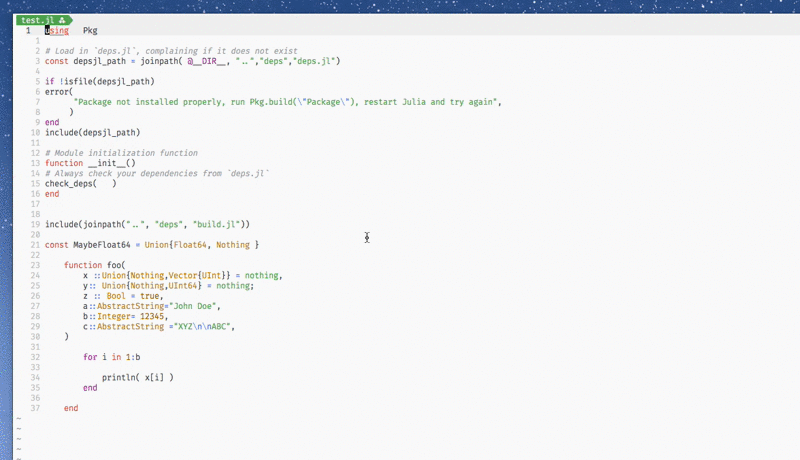Width-sensitive formatter for Julia code. Inspired by gofmt, refmt, and black.
]add JuliaFormatterjulia> using JuliaFormatter
# Recursively formats all Julia files in the current directory
julia> format(".")
# Formats an individual file
julia> format_file("foo.jl")
# Formats a string (contents of a Julia file)
julia> format_text(str)Check out the docs for further description of the formatter and its options.
default:
4
The number of spaces used for an indentation.
default:
92
The maximum length of a line. Code exceeding this margin will be formatted across multiple lines.
default:
false
If true, = is always replaced with in if part of a for loop condition.
For example, for i = 1:10 will be transformed to for i in 1:10. Set
this to nothing to leave the choice to the user.
default:
false
If true, whitespace is added for type definitions. Make this true
if you prefer Union{A <: B, C} to Union{A<:B,C}.
default:
false
If true, whitespace is added for binary operations in indices. Make this
true if you prefer arr[a + b] to arr[a+b]. Additionally, if there's
a colon : involved, parenthesis will be added to the LHS and RHS.
Example: arr[(i1 + i2):(i3 + i4)] instead of arr[i1+i2:i3+i4].
default:
false
If true, superfluous newlines will be removed. For example:
module M
a = 1
function foo()
return nothing
end
b = 2
endis rewritten as
module M
a = 1
function foo()
return nothing
end
b = 2
endModules are the only type of code block allowed to keep a single newline prior to the initial or after the final piece of code.
default:
false
If true, import expressions are rewritten to using expressions
in the following cases:
import A
import A, B, Cis rewritten to:
using A: A
using A: A
using B: B
using C: CExceptions:
If as is found in the import expression. using CANNOT be used in this context. The following example will NOT BE rewritten.
import Base.Threads as thIf import is used in the following context it is NOT rewritten. This may change in a future patch.
@everywhere import A, Bdefault:
false
If true, x |> f is rewritten to f(x).
default:
false
Transforms a short function definition
f(arg1, arg2) = bodyto a long function definition
function f(arg2, arg2)
body
enddefault:
false
If true, return will be prepended to the last expression where
applicable in function definitions, macro definitions, and do blocks.
Example:
function foo()
expr1
expr2
endto
function foo()
expr1
return expr2
enddefault:
true
If true, = in keyword arguments will be surrounded by whitespace.
f(; a=4)to
f(; a = 4)An exception to this is if the LHS ends with "!" then even if whitespace_in_kwargs is
false, = will still be surrounded by whitespace. The logic behind this intervention being
on the following parse the ! will be treated as part of =, as in a "not equal" binary
operation. This would change the semantics of the code and is therefore disallowed.
default:
true
Annotates fields in a type definitions with ::Any if no type annotation is provided:
struct A
arg1
endto
struct A
arg1::Any
enddefault:
false
Format code docstrings with the same options used for the code source.
Markdown is formatted with CommonMark alongside Julia code.
default:
false
See Custom Alignment documentation.
default:
false
If the conditional E ? A : B exceeds the maximum margin converts it into the equivalent if block:
if E
A
else
B
enddefault:
"auto"
One of "unix" (normalize all \r\n to \n), "windows" (normalize all \n to \r\n), "auto" (automatically
choose based on which line ending is more common in the file).
default:
true
One of true, false, or nothing.
Trailing commas are added after the final argument when nesting occurs and the closing punctuation appears on the next line.
For example when the following is nested (assuming DefaultStyle):
funccall(arg1, arg2, arg3)it turns into:
funccall(
arg1,
arg2,
arg3, # trailing comma added after `arg3` (final argument) !!!
)- When set to
true, the trailing comma is always added during nesting. - When set to
false, the trailing comma is always removed during nesting. - When set to
nothing, the trailing comma appears as it does in the original source.
default:
false
When true lines are joined as they appear in the original source file.
function foo(arg1,
arg2, arg3
)
body
endWhen false and the maximum margin is > than the length of "function foo(arg1, arg2, arg3)"
this is formatted to
function foo(arg1, arg2, arg3)
body
endWhen true, arg1 and arg2, arg3 will remain on separate lines even if they can fit on the
same line since it's within maximum margin. The indentation is dependent on the style.
function foo(arg1,
arg2, arg3,
)
endThere are exceptions to this:
if a body1 elseif b body2 else body3 endwill be formatted to the following, even if this option is set to true:
if a
body1
elseif b
body2
else
body3
end!!! warning
The maximum margin still applies even when this option is set to `true`.
default:
false
When set to true, submodule(s) appearing in the same file will be indented.
module A
a = 1
module B
b = 2
module C
c = 3
end
end
d = 4
endwill be formatted to:
module A
a = 1
module B
b = 2
module C
c = 3
end
end
d = 4
enddefault:
true
If true the file will be reformatted in place, overwriting the existing file;
if it is false, the formatted version of foo.jl will not be written anywhere.
default:
false
If true details related to formatting the file will be printed to stdout.
default:
false
If true, Markdown files are also formatted. Julia code blocks will be formatted in
addition to the Markdown being normalized.
For integration with other editors:



